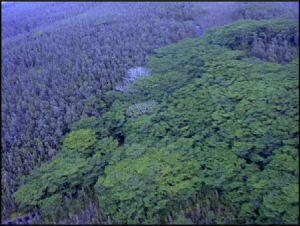OPINION: Councilman Zendo Kern vs the Albizia Trees
For the most part, good fences make good neighbors.
But while an 8-foot barrier is pretty good at keeping out dogs, cattle, and sheep, it’s not likely to stand a chance against a 100-foot-tall giant.
That imagery may seem a bit extreme, but in fact represents a very real problem facing Hawaii landowners.
Native to Papua New Guinea and the Solomon Islands, Falcataria Moluccana, otherwise known as “albizia” trees, have proven to be incredibly invasive on the Big Island. Known informally as “the tree that ate Puna,” the plants spread rapidly, more than tripling their density in the area surrounding Rainbow Falls over the last 16 years.
Apart from covering large swaths of land, the trees also can reach heights in excess of 100 feet at shocking speed, with at least one plant documented growing an average of one inch per day. The trees can quickly crowd out ohia forests, where the native plants may grow at a rate of only one to two inches per month.
The rapid spread of the trees is causing a heated debate over not only how to control a growing threat to human life and property, but over who should bear the burden of responsibility when it comes to removing dangerously overgrown flora in general.
Hawaii County Councilmember Zendo Kern introduced Bill 64 this year in response to the problem. Known as the “Albizia Bill,” Kern’s proposal would enable the county to clear unsafe trees on both occupied lots and vacant land if the landowners fail to do so, placing a lien on the affected properties if necessary.
Although the bill has the support of environmental groups and the Hawaii Invasive Species Council, opponents fear the new law could snap the budgets of low-income landowners.
It’s a legitimate concern, given that a single towering albizia tree can cost upwards of $10,000 to cut and haul away. Self-removal is possible, but extremely dangerous. In March of 2012, an HPP resident was killed while attempting to fell an albizia that was 9 inches in diameter.
Some opponents also fear the bill could put the county at the center of feuds between landowners, and claim there isn’t enough manpower or resources to properly address disputes, much less actually clear the affected properties.
But despite the challenges involved, Bill 64 still represents an important step toward holding landowners accountable for the condition of their property. As the law currently stands, many landowners can go decades without setting foot on their vacant properties, and have little incentive to keep dangerous trees in check.
As the council works to refine the proposed law, they should maintain the enforcement mechanism to hold landowners accountable, but develop ways to spread out the cost to low-income residents over time.
Property tax adjustments, installment payments and other methods could be used to lower the upfront cost of clearing out dangerous trees. If those obligations are transferable and made public during property sales, potential buyers could adjust their purchasing price to reflect the costs they may face from the county.
Although clearing overgrown invasives like albizia and faya (found in areas around Volcano) can be expensive, it is simply unreasonable to expect responsible landowners to sit helpless while a neighbor’s negligence threatens to harm their health or property.










